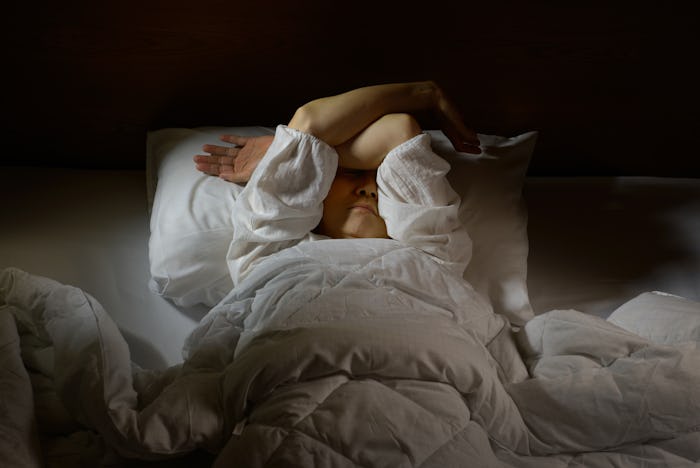Life

When Does Postpartum Insomnia Go Away? It's Like A Cruel Joke
“Sleep when the baby sleeps” is the well-meaning, albeit overly-simplified, advice received by almost every new parent (and you can also do laundry when the baby sleeps, and meal prep when the baby sleeps... *sigh*) Even when you're bone-tired, you may find that in the weeks after your child is born, you’re actually not able to sleep when you do get the chance. It's horribly unfair. So how long does postpartum insomnia last?
The first thing to note is that unlike postpartum depression, “postpartum insomnia is not a defined disorder,” as clinical psychologist and sleep specialist Janet Kennedy Ph.D. tells Romper. And while it may not be recognized as a specific diagnosis, postpartum insomnia is still very real and affects many new parents. Postpartum insomnia, which can mean you have trouble falling asleep or that you wake up in the middle of the night and can’t fall back to sleep, is caused by several factors. “First and foremost are the hormonal changes that occur after birth. Estrogen and progesterone levels drop dramatically, which can cause insomnia. Oxytocin spikes, which feels good, but can cause hyperarousal for some people,” Kennedy says.
A lack of sleep is a normal part of having a newborn, so it can be hard to discern general fatigue versus insomnia. Broadly speaking, “with time, good diet, and some exercise, sleep issues improve,” Danny Lickness M.D. tells Romper. “If by your six-week postpartum doctors visit, you are still not sleeping as well as you would like, tell you doctor or midwife. Insomnia may be part of postpartum depression.”
Postpartum insomnia (also sometimes called postnatal insomnia) can also be a symptom of postpartum mood and anxiety disorders (PMADS), Kennedy says, so it’s important to share information about your sleep (or lack thereof) with your doctor, especially if your insomnia is consistent or lasts all night.
“Being responsible for a helpless human being prompts a level of increased vigilance — [you're] prepared to spring into action at any moment, looking out for danger, trying to feel confident doing something new and scary,” Kennedy tells Romper. “That can turn into hyper-vigilance, which turns on the body's fight or flight response, releasing adrenaline that's designed to fend off sleep while you escape whatever danger you're in. Once insomnia happens, new moms start to ruminate and worry about sleep, which starts a stress loop that exacerbates the insomnia.”
Insomnia begets insomnia, and as annoying as this is, the more you stress about not sleeping, the less likely you are to sleep. Even when you know your baby is fed and sleeping soundly, you still may not be able to turn off.
One study published in the European Journal of Obstetrics & Gynecology and Reproductive Biology looked at the relationship between insomnia and postpartum pain and found that around “15% of the adult population fulfills the diagnostic criteria for an insomnia disorder as defined by difficulty initiating or maintaining sleep, for at least three months, in combination with impaired daytime functioning caused by the sleep disturbance.” The same study also found that women report insomnia more frequently than men, and that chronic insomnia was associated with an “increased risk of developing postpartum pain symptoms.” You could also be having trouble sleeping because of physical pain like cracked nipples, Lickness says, and discomfort, like not being able to sleep on your stomach, can also be a trigger for insomnia to start in pregnancy and carry into the postpartum period.
Unfortunately there’s not a magical amount of time after which all symptoms of postpartum insomnia will go away. There are things you can do that can help you get some much-needed rest, however. “[The] most important is to allow some time to unwind before trying to sleep. The brain can't come to a full stop after running on all cylinders, even when the body is physically exhausted. Reading fiction for a few minutes before bed can be very helpful because it helps to steer the brain away from the stresses of life while the body settles in,” Kennedy tells Romper.
Lickness gives the following suggestions for easing your body into sleep:
- Reduce caffeine consumption and avoid after 2 p.m.
- Keep the bed for sleep and sex only. Have a rocking chair with a comforter to rock and feed your baby.
- Turn off electronics, TV, your phone, and laptop when you go to bed. Do not watch TV in bed.
- Keep your bedroom dark and cool. Keep nighttime light to a minimum.
- Avoid exercising just before going to bed.
While you will have to wake up during the night to feed the baby, if you're preparing bottles try to keep the lights dim. And remember, you don't have to struggle in silence or just accept that being exhausted is the new normal. Insomnia shouldn't be normalized.
"If insomnia persists, talk to a doctor about medication to help you through this difficult period," Kennedy tells Romper. "There are medications that are safe to take when breastfeeding. The postpartum period is stressful, and insomnia makes it much harder. It does pass, but it's important to get help if you are struggling."
Experts:
Dr. Janet Kennedy, PhD, clinical psychologist, and founder of NYC Sleep Doctor
Dr. Danny Lickness, M.D., OB Hospitalist at Sierra Vista Regional Medical Center in San Luis Obispo, Calif.
Studies Referenced:
Børge Sivertsen, et al. (2017). Insomnia before and after childbirth: The risk of developing postpartum pain—A longitudinal population-based study. European Journal of Obstetrics & Gynecology and Reproductive Biology. http://dx.doi.org/10.1016/j.ejogrb.2017.01.020
This article was originally published on